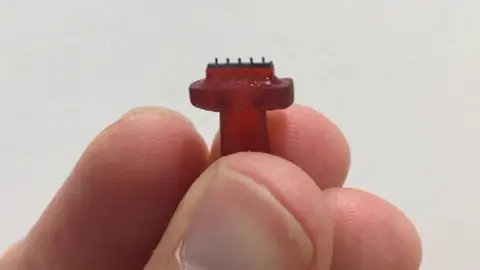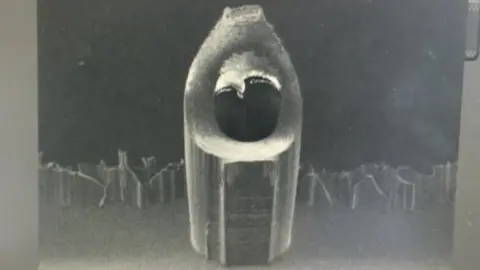Diabetes: Smart patch micro needles 'to revolutionise' care
Smart patches fitted with micro needles to deliver insulin could "revolutionise" treatment for diabetes sufferers, scientists have claimed.
The 0.7mm hollow needles would be less intrusive than standard needles by only perforating the surface of the skin.
The patch would monitor insulin levels and the micro needles deliver the dose.
Scientists in Swansea believe micro needles will change medicinal delivery in various ways, such as being attached to a syringe to administer vaccines.
Prof Owen Guy, director of the Centre of NanoHealth and head of chemistry at Swansea University, said combining the smart patch and the injection would be the ultimate aim.
But in the meantime, the focus is on bringing the silicon-based needles into production over the next two years, which could be worth "billions of pounds".
"There are very few hollow micro needles being developed and certainly very few on the market," he said.
"I think that's because it is particularly challenging to develop a hollow micro needle with a sharp tip.
"The sharpness of the tip determines how easy it is to penetrate the skin and the efficacy of the injection and therefore the efficacy of the delivery of the drug into the skin."
The micro needles are being developed with Newport-based SPTS Technologies and only penetrate the top layer of skin where there are no blood vessels or nerve cells.

"We are in the final stages of manufacturing our prototype devices," Prof Guy said, adding that with mass production, micro needles would cost less than £1.
"These have already been tested and shown to be very effective. But there's still a lot to do before we go into clinical trials and then develop a product such as an insulin delivery system."
Just under 3.7m people in the UK have been diagnosed with diabetes, according to official figures.
Those with type 1 diabetes need to treat the condition with insulin to control blood sugar levels and the same applies for some people with type 2. This is mostly done through injecting.
"Injecting the right volume of dose is really important and controlling a dose through a combined delivery system and diagnostic system [smart patch] - that's the future," Prof Guy said.
"It would be a wearable patch system, probably replaced on a daily basis.
 Swansea University
Swansea University"The monitoring system would be hooked up to a very small unobtrusive system where it feeds into your smart phone, for example, and it tells you when you need to inject the volume of drug."
Huma Ashraf, from SPTS Technologies, said developing micro needles was important because "it revolutionises the whole use of needles for applying drugs and insulin" and added they were working with "several groups" to develop smart patches containing micro needles.
"The fact you've got them in silicon on a platform that already exists to make chips that are in your smart phone means we've already got the infrastructure there," she added.
The project has been welcomed by Diabetes UK.
"Any technology that makes it easier for people to administer their insulin can only be good," said Douglas Twenefour, the charity's deputy head of care.